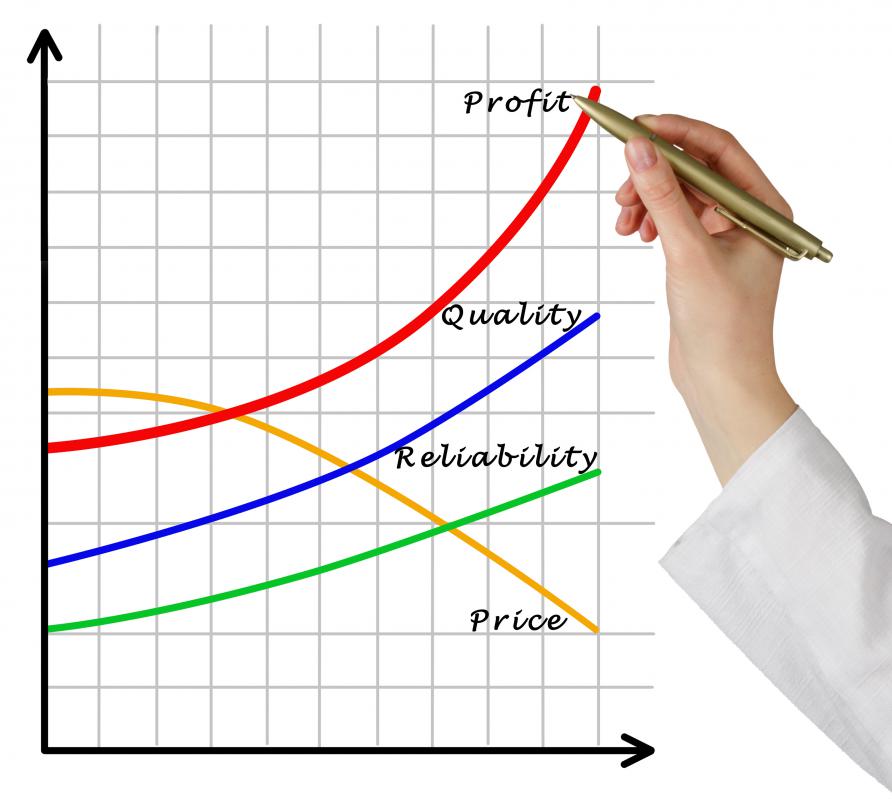At WiseGEEK, we're committed to delivering accurate, trustworthy information. Our expert-authored content is rigorously fact-checked and sourced from credible authorities. Discover how we uphold the highest standards in providing you with reliable knowledge.
What is Equity Cash Flow?
Equity cash flow represents funds a company receives from investors. While the most common form of equity financing is from common and preferred stock sales, companies can also receive direct investment from other companies and large private investors. Business owners and managers will measure the performance of this financing through a few common metrics. These metrics include return on equity, free cash flow to equity and the debt to equity ratio. Financial performance management is important because investors desire a return on their capital.
Return on equity is a basic financial performance metric that measures how well the company generates profits from equity cash flow. The basic formula is net income divided by total shareholder’s equity. Investors look at this metric to determine how well the company can take invested funds and generate more revenue through normal business operations. A negative return on equity means the company is losing money from invested capital, i.e. shareholders are losing a portion of their invested capital.

The free cash flow to equity formula measures the amount of money the organization makes from equity financing. This metric is often a better measurement of economic wealth, as it tracks the cash generated by the company. Free cash flow to equity is a bit more difficult to calculate. The formula is net income less net capital expenditures less change in working capital plus new debt less debt repayment. Investors like to see a positive equity cash flow, as it indicates the company has more cash to reinvest into the business or pay out in dividends. Dividends represent an immediate payback on capital from investors.

The final performance metric for measuring equity cash flow is the debt to equity ratio. This formula does not necessarily measure equity cash flow, but how the company uses external financing. Using too much debt financing indicates the company will have to pay out more money in interest to lenders, ultimately reducing the company equity cash flow. The formula for the debt to equity ratio is total liabilities divided by shareholder’s equity.
Cash flow is typically a more important financial measure, as net income — and earnings per share calculated from net income — are accounting figures. This means the figures are not necessarily a true indicator of economic wealth. When measuring investments, fundamental analysis techniques measure historical cash flow. This allows investors to look at the company behind the stock sold on open exchanges.
AS FEATURED ON:
AS FEATURED ON:












Discussion Comments
Personally, I’d rather be in a cash flow business – one that generates income month after month. Real estate, in my opinion, is one such business, assuming you do it right.
I have a friend who rents out three properties each month, and makes enough money to cover the mortgages on all three properties while having extra profit left over.
Sure, he has to do some maintenance stuff now and then; but he protects himself by hiring only qualified renters who have been vetted by credit and background checks and treat the properties as if they were their homes.
He’s not getting rich, but is making decent supplemental income.
@hamje32 - Instinctively, I’d like to agree in principle to the importance of cash flow. However, I don’t get why the valuation of a company – particularly an Internet firm – can sometimes be in the billions of dollars, even as the company fails to make a dime year after year.
I suppose that public expectations and soaring stock prices keep the business afloat. But I don’t think that’s a safe foundation upon which to keep building a business, as witnessed in the dot com bubble crash.
@SkyWhisperer - I agree - I do think that operating cash flow trumps all other metrics in business, bar none. If you’re out of money, your business is finished.
That’s why smart businesses make sure that they have enough reserves to fund their operations from month to month. I work for a small business, and the fact is that some months are really slow.
The company president makes sure that he has at least six months worth of cash reserves to buffer against the slow periods so that he can continue to meet payroll and other expenses. I think this is good advice for anyone to follow.
Conversely, during the months when money is flowing in freely, he sets the surplus aside as a hedge against the slow months, rather than splurging on needless business expenses.
I worked for a large telecommunications company for several years, and the most important measure that investors looked at was its cash flow statement. Of course, profit and loss was important as well, but the company had not been making money for awhile, so it was basically in survival mode.
It was a race against time to see how long the company could continue to finance its current operations with cash on hand. Every quarter they released statements indicating how much money they had on hand.
We (as employees) got to the point where we could calculate the company’s burn rate from quarter to quarter; it was simple math to do cash flow analysis and determine when we'd be out of money, and file for bankruptcy.
Our predictions, unfortunately, turned out to be correct – not once, but twice. After two bankruptcies, we finally got bought out, which was the best thing in the end.
Post your comments